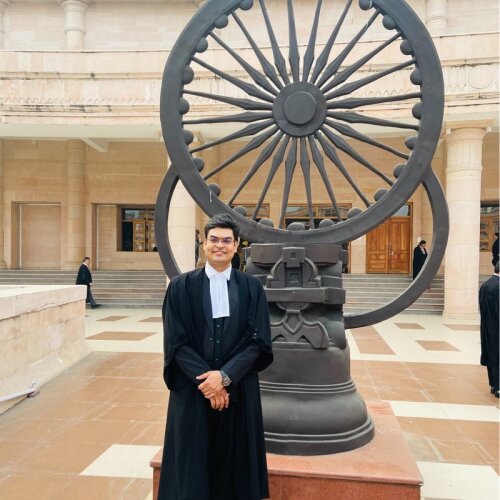Best Inheritance Law Lawyers in Lucknow
Share your needs with us, get contacted by law firms.
Free. Takes 2 min.
List of the best lawyers in Lucknow, India
1. About Inheritance Law in Lucknow, India
Lucknow, the capital of Uttar Pradesh, follows India’s system of personal laws for inheritance based on religion. This means Hindus, Muslims, Christians and other communities may have different rules for passing on property after death. In practice, most Lucknow cases involve the Hindu Succession Act, the Indian Succession Act, or Muslim personal law, depending on the deceased’s identity. The Allahabad High Court, Lucknow Bench, and local district courts handle related disputes including probate, partition, and challenging or validating wills.
Inheritance matters in Lucknow often require clear documentation and professional guidance to determine rightful shares, file petitions, and navigate court procedures. Court processes may involve partitions of ancestral property, establishing heirs, or obtaining probate of a will. Understanding which law applies is essential to pursuing a lawful and timely resolution.
2. Why You May Need a Lawyer
- A daughter seeks coparcenary rights in ancestral property after the 2005 amendments to the Hindu Succession Act, to secure her share in a Lucknow family
- A widow claims her legal share in a husband’s Hindu family property and needs guidance on filing for succession in Lucknow
- A family needs probate for a Will or to prove intestate succession for immovable property located in Lucknow district
- A Muslim heir disputes the distribution of estate under Sharia rules after a parent’s death in Lucknow, including calculations of shares among heirs
- An executor or legal heir wants a partition decree to physically divide ancestral property among siblings in Lucknow
- A beneficiary suspects a Will is forged or improperly executed and seeks grounds to challenge it in the Lucknow courts
In each scenario, a local inheritance law solicitor or advocate can assess documents, identify the applicable law, and prepare pleadings, petitions, or partition deeds aligned with Lucknow’s court procedures and timelines.
3. Local Laws Overview
Below are the main statutes that govern inheritance matters in Lucknow, with notes on applicability and recent changes where relevant.
Hindu Succession Act, 1956
The Hindu Succession Act governs succession for Hindus, Buddhists, Jains and Sikhs in matters of property after death. A key change came with the Hindu Succession (Amendment) Act, 2005, which granted daughters equal coparcenary rights from birth in certain circumstances. This act also clarified who can be a coparcener and how property passes on death for families in Lucknow and across Uttar Pradesh. In practice, this means daughters can claim a share in ancestral property along with sons, subject to qualifications and existing family arrangements.
Indian Succession Act, 1925
This act covers probate and succession for Christians, Parsis and others who fall outside Hindu, Muslim or Jain family laws. It provides the framework for proving a Will, applying for probate, or handling intestate succession where there is no valid Will. In Lucknow, Christian families or other communities typically pursue matters under this act in district courts or the appropriate civil court.
Muslim Personal Law (Shariat) Application Act, 1937
The Shariat Act applies to inheritance matters for Muslims in Lucknow and throughout Uttar Pradesh. It governs the distribution of a deceased Muslim's estate among heirs according to Sharia rules, including shares for male and female heirs and the appointment of executors or guardians where applicable. It is important to recognize that local practices and family customs can influence how these rules are applied in specific cases.
"The 2005 amendment to the Hindu Succession Act extended coparcenary rights to daughters, aligning succession outcomes with modern expectations of equal inheritance within Hindu families."
Source: Law Commission of India - Hindu Succession Act amendments and guidance on coparcenary rights
"Probate and succession processes in India are overseen by the Indian Succession Act and related rules, with court procedures varying by jurisdiction."
Source: National Portal of India - overview of succession laws and probate processes
Source: eCourts Lucknow - information on online filing, case status tracking, and court procedures relevant to inheritance matters
Recent trends in Lucknow experience greater digitization of court processes. The eCourts platform enables online filing and status checks for civil matters, which can affect probate, partition and succession cases.
4. Frequently Asked Questions
What is the Hindu Succession Act, 1956 and who does it cover?
The Hindu Succession Act governs Hindu property succession after death. It applies to Hindus, Buddhists, Jains and Sikhs, including those living in Lucknow. It clarifies shares for heirs and, after the 2005 amendment, grants daughters coparcenary rights in ancestral property.
How do I file for probate of a Will in Lucknow?
To file for probate in Lucknow, you typically visit the district court or the relevant civil court with the original Will, death certificate, and property documents. A lawyer helps prepare the petition and supporting affidavits for submission.
Do daughters get equal rights to joint family property after 2005?
Yes. The 2005 amendment to the Hindu Succession Act gives daughters the same coparcenary rights as sons, subject to eligibility and specific family arrangements in Lucknow.
What documents are needed for inheritance proceedings in Lucknow?
Common documents include death certificate, identity proofs of heirs, title deeds of property, previous will (if any), genealogy or family tree, and any court orders or partitions already recorded.
How long do probate or succession cases take in Lucknow courts?
Timeline varies by complexity and court workload. Simple probate matters may take 6 to 12 months, while complex partitions or challenges can extend to 1-2 years or more.
Can a Will be challenged in Lucknow?
Yes. A Will can be challenged on grounds such as lack of testamentary capacity, coercion, undue influence, or improper execution. A qualified solicitor can assess grounds and file objections if needed.
How much does a lawyer charge for inheritance matters in Lucknow?
Lawyer fees vary by case complexity and attorney experience. Typical consultations may range from a few thousand rupees to several tens of thousands for contested matters, plus court costs and stamp duties.
Should I hire a lawyer for partition of ancestral property in Lucknow?
Yes. A lawyer helps prepare partition deeds, negotiate among heirs, and represent you in court to obtain a formal partition decree and final settlement.
What is the difference between probate and succession?
Probate validates a Will and grants the executor authority to administer the estate. Succession governs distribution of property when there is no Will or after probate, according to applicable personal laws.
Do I need to have ancestral property to claim a share?
Not always. Under the Hindu Succession Act, coparcenary rights may apply to daughters in ancestral property. Other laws may apply to different communities and property types.
Is there a deadline to file a succession or probate case in Lucknow?
Yes. Deadlines vary by circumstance and court rules. Generally, probate petitions should be filed within a reasonable period after death, and delays can complicate recovery of shares.
Where can I find government resources about inheritance law in Lucknow?
Official information is available through government portals and legal resources. See the National Portal of India and the Law Commission for guidance, and use eCourts for case-specific information.
5. Additional Resources
- eCourts Lucknow - Official portal for court services, online filing, and case status in Lucknow. https://districts.ecourts.gov.in/lucknow
- National Portal of India - Central government resource with information on inheritance law concepts and citizen services. https://www.india.gov.in/
- Law Commission of India - Official body for legal reforms and guidance on personal laws including inheritance. https://lawcommissionofindia.nic.in/
6. Next Steps
- Identify the legal framework: determine whether the matter falls under Hindu, Muslim, Indian Succession Act or other personal law in Lucknow.
- Collect essential documents: death certificate, property titles, identity proofs of heirs, and any existing wills or partitions.
- Consult a Lucknow-based inheritance law solicitor for an initial assessment of your case and expected timeline.
- Decide on the appropriate remedy: probate, succession, or partition, in consultation with your lawyer.
- Prepare pleadings and petitions: your attorney drafts and files in the correct Lucknow court and handles court notices.
- Monitor the case and respond to court directions: use the eCourts portal for status updates and filings.
- Review the final decree or order: obtain certified copies and complete any required transfers or registrations in Lucknow.
Lawzana helps you find the best lawyers and law firms in Lucknow through a curated and pre-screened list of qualified legal professionals. Our platform offers rankings and detailed profiles of attorneys and law firms, allowing you to compare based on practice areas, including Inheritance Law, experience, and client feedback.
Each profile includes a description of the firm's areas of practice, client reviews, team members and partners, year of establishment, spoken languages, office locations, contact information, social media presence, and any published articles or resources. Most firms on our platform speak English and are experienced in both local and international legal matters.
Get a quote from top-rated law firms in Lucknow, India — quickly, securely, and without unnecessary hassle.
Disclaimer:
The information provided on this page is for general informational purposes only and does not constitute legal advice. While we strive to ensure the accuracy and relevance of the content, legal information may change over time, and interpretations of the law can vary. You should always consult with a qualified legal professional for advice specific to your situation.
We disclaim all liability for actions taken or not taken based on the content of this page. If you believe any information is incorrect or outdated, please contact us, and we will review and update it where appropriate.










